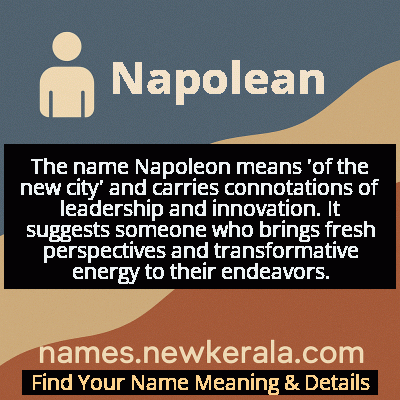Napolean Name Meaning & Details
Origin, Popularity, Numerology Analysis & Name Meaning of Napolean
Discover the origin, meaning, and cultural significance of the name NAPOLEAN. Delve into its historical roots and explore the lasting impact it has had on communities and traditions.
Name
Napolean
Gender
Male
Origin
Greek
Lucky Number
6
Meaning of the Name - Napolean
The name Napoleon means 'of the new city' and carries connotations of leadership and innovation. It suggests someone who brings fresh perspectives and transformative energy to their endeavors.
Napolean - Complete Numerology Analysis
Your Numerology Number
Based on Pythagorean Numerology System
Ruling Planet
Venus
Positive Nature
Harmonious, responsible, caring, and artistic.
Negative Traits
Overly idealistic, superficial, possessive, or jealous.
Lucky Colours
Pink, turquoise.
Lucky Days
Friday.
Lucky Stones
Diamond, turquoise.
Harmony Numbers
2, 3, 9.
Best Suited Professions
Artists, musicians, teachers, healthcare workers.
What People Like About You
Warmth, nurturing nature, artistic flair.
Famous People Named Napolean
Napoleon Bonaparte
Military leader and emperor
Emperor of the French who transformed European political landscape through military campaigns and legal reforms
Napoleon III
Monarch
Last monarch of France who modernized Paris and expanded French colonial empire
Napoleon Lajoie
Baseball player
Hall of Fame second baseman and one of baseball's greatest hitters
Napoleon Hill
Author and motivational speaker
Pioneering self-help author of 'Think and Grow Rich'
Name Variations & International Equivalents
Click on blue names to explore their detailed meanings. Gray names with will be available soon.
Cultural & Historical Significance
Beyond the French emperor, the name has appeared in various cultural contexts including literature, film, and even as a brand name for pastries and consumer products. In American culture, the name gained additional recognition through figures like Napoleon Dynamite in popular film, creating a modern counterpoint to the historical gravitas. The name continues to evoke complex associations with leadership, controversy, and transformative change across different societies.
Extended Personality Analysis
Individuals named Napoleon are often perceived as ambitious, strategic thinkers with strong leadership qualities. The historical association suggests someone who is determined, organized, and capable of implementing significant changes. They may exhibit confidence in their abilities and a tendency to take charge in challenging situations, often displaying innovative problem-solving skills.
However, the name also carries connotations of potential arrogance or overambition, reflecting the complex legacy of Napoleon Bonaparte. Modern bearers of the name might develop either an embrace of these strong personality traits or a conscious effort to distinguish themselves from the historical figure. The name suggests someone who is not afraid to challenge conventions and who possesses both the vision to see grand possibilities and the practical mindset to pursue them systematically.
Modern Usage & Popularity
In contemporary times, the name Napoleon has become relatively uncommon as a given name, primarily due to the overwhelming association with the French emperor. Modern usage tends to be selective, often chosen by parents with particular historical interests or those seeking a distinctive, powerful-sounding name. The name appears more frequently in fiction and media than in birth registries, and its usage has declined significantly since the 19th century. Current trends show it ranking outside the top 1000 names in most English-speaking countries, though it maintains some presence in certain European and Latin American communities where the historical connections are viewed more neutrally.
Symbolic & Spiritual Meanings
Symbolically, Napoleon represents ambition, military strategy, and transformative leadership. The name evokes images of empire-building, legal reform, and the complex interplay between genius and overreach. It symbolizes the capacity for individual will to reshape societies and challenge established orders. Metaphorically, the name suggests both the heights of human achievement and the dangers of unchecked ambition, serving as a cautionary tale about the limits of power. In psychological terms, it represents the archetype of the revolutionary leader who breaks from tradition to create new systems, embodying both creative destruction and the human cost of radical change.

